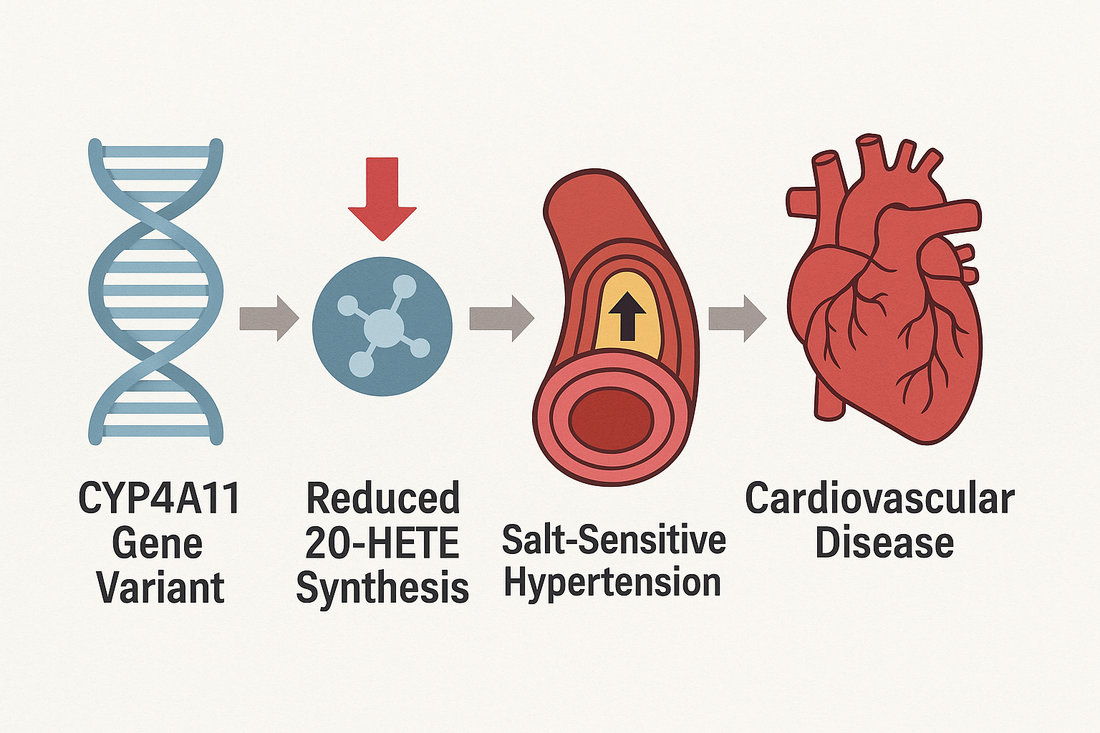CYP4A11: A Genetic Driver of Hypertension and Cardiovascular Risk
Introduction
The CYP4A11 gene encodes a cytochrome P450 enzyme that metabolizes arachidonic acid into 20-hydroxyeicosatetraenoic acid (20-HETE). This lipid mediator plays a crucial role in vascular tone, sodium excretion, and kidney function.
Variants in CYP4A11 alter 20-HETE synthesis, predisposing individuals to salt-sensitive hypertension, vascular dysfunction, and increased cardiovascular disease (CVD) risk. The CardiaX test evaluates CYP4A11 polymorphisms to help clinicians design precision-based strategies for prevention and intervention.
Biological Role of CYP4A11
-
20-HETE production: Regulates renal sodium transport and vascular smooth muscle tone.
-
Blood pressure control: Balances vasoconstriction and sodium handling; disruptions lead to salt-sensitive hypertension.
-
Endothelial health: Modulates nitric oxide signaling and vascular reactivity.
-
Renal physiology: Critical for kidney microcirculation and tubular sodium reabsorption.
Key CYP4A11 Variants
rs1126742 (T8590C, Ile198Val)
-
Most studied CYP4A11 polymorphism.
-
Associated with reduced enzyme activity and impaired 20-HETE synthesis.
-
Carriers of the C allele have increased risk of hypertension, stroke, and cardiovascular disease, particularly in the context of high-salt intake.
Other rare variants
-
Less common coding changes may alter enzymatic efficiency and further modify blood pressure regulation.
How CYP4A11 Variants Elevate Cardiovascular Risk
-
Salt-sensitive hypertension — Reduced 20-HETE leads to impaired sodium excretion, raising blood pressure.
-
Vascular dysfunction — Deficiency in 20-HETE disrupts endothelial NO signaling and promotes vasoconstriction.
-
Kidney injury — Altered renal hemodynamics can worsen CKD progression, compounding CVD risk.
-
Atherosclerosis and stroke — Hypertension plus endothelial dysfunction accelerates plaque formation and cerebrovascular risk.
Factors That Exacerbate CYP4A11-Related Risk
-
High dietary sodium intake
-
Obesity and insulin resistance
-
Chronic kidney disease (CKD)
-
Sedentary lifestyle
-
Smoking and oxidative stress
-
High alcohol intake
Strategies to Mitigate Risk
1. Lifestyle Modifications
-
Nutrition:
-
Limit sodium to <2,000 mg/day (especially important for carriers of the risk allele).
-
Adopt a DASH or Mediterranean diet: rich in vegetables, fruits, whole grains, nuts, legumes, and fish.
-
Reduce processed foods and excess sugar to improve insulin sensitivity.
-
Ensure adequate potassium and magnesium (leafy greens, nuts, seeds, legumes) for blood pressure control.
-
-
Exercise:
-
150+ minutes/week of aerobic exercise plus resistance training.
-
Improves vascular function and lowers blood pressure.
-
-
Weight optimization:
-
Even modest 5–10% reductions in body weight can normalize blood pressure in salt-sensitive individuals.
-
2. Nutraceuticals
-
Omega-3 fatty acids — Omega 1300: Improve endothelial function and lower blood pressure.
-
CoQ10 Omega — CoQ10 Omega: Supports mitochondrial and vascular health.
-
Magnesium glycinate: Natural vasodilator, helps reduce blood pressure.
-
Curcumin Complex — Curcumin Complex: Anti-inflammatory, reduces endothelial dysfunction.
-
Vitamin D/K2: Supports cardiovascular and renal health.
-
N-acetylcysteine (NAC): Boosts antioxidant defense and reduces oxidative stress in vasculature.
3. Peptides
-
MOTS-c: Improves insulin sensitivity and vascular health.
-
BPC-157: Promotes vascular repair and protects microcirculation.
-
KPV: Anti-inflammatory peptide that reduces vascular and systemic inflammation.
4. Medications
-
First-line antihypertensives:
-
ACE inhibitors or ARBs: Reduce vasoconstriction, protect kidneys.
-
Thiazide diuretics: Particularly effective for salt-sensitive hypertension.
-
Calcium channel blockers: Improve vasodilation and reduce vascular resistance.
-
-
Add-on therapy:
-
Mineralocorticoid receptor antagonists (spironolactone, eplerenone): For resistant hypertension.
-
-
CKD management: Tight BP control slows progression of renal damage.
Case Example
Patient: 55-year-old woman with hypertension despite moderate lifestyle efforts. CardiaX shows CYP4A11 rs1126742 risk allele (C carrier). BP averages 148/92 mmHg, sodium intake high from processed foods, family history of stroke.
Plan:
-
Lifestyle: Sodium reduction, Mediterranean diet, structured aerobic training.
-
Supplements: Omega 1300, CoQ10 Omega, Curcumin Complex, magnesium.
-
Peptide: MOTS-c for metabolic health and KPV for vascular inflammation.
-
Medications: Initiated ARB plus low-dose thiazide diuretic.
-
6-month follow-up: BP 122/78 mmHg, improved energy, hs-CRP reduced, PULS markers improved.
The Bottom Line
CYP4A11 variants, particularly the rs1126742 C allele, predispose to salt-sensitive hypertension and cardiovascular disease. By identifying these variants with CardiaX testing, clinicians can take a precision-based approach to optimize nutrition, lifestyle, supplements, peptides, and medications—dramatically reducing cardiovascular risk.
References
-
Gainer JV, et al. Functional variant of CYP4A11 associated with essential hypertension. Hypertension.
-
Ward NC, et al. Cytochrome P450 metabolites of arachidonic acid and cardiovascular disease. Pharmacol Ther.
-
Laffer CL, et al. Genetic variation in CYP4A11 and blood pressure regulation. J Hypertens.
-
Zordoky BN, et al. CYP enzymes, hypertension, and cardiovascular risk. Pharmacol Rev.


